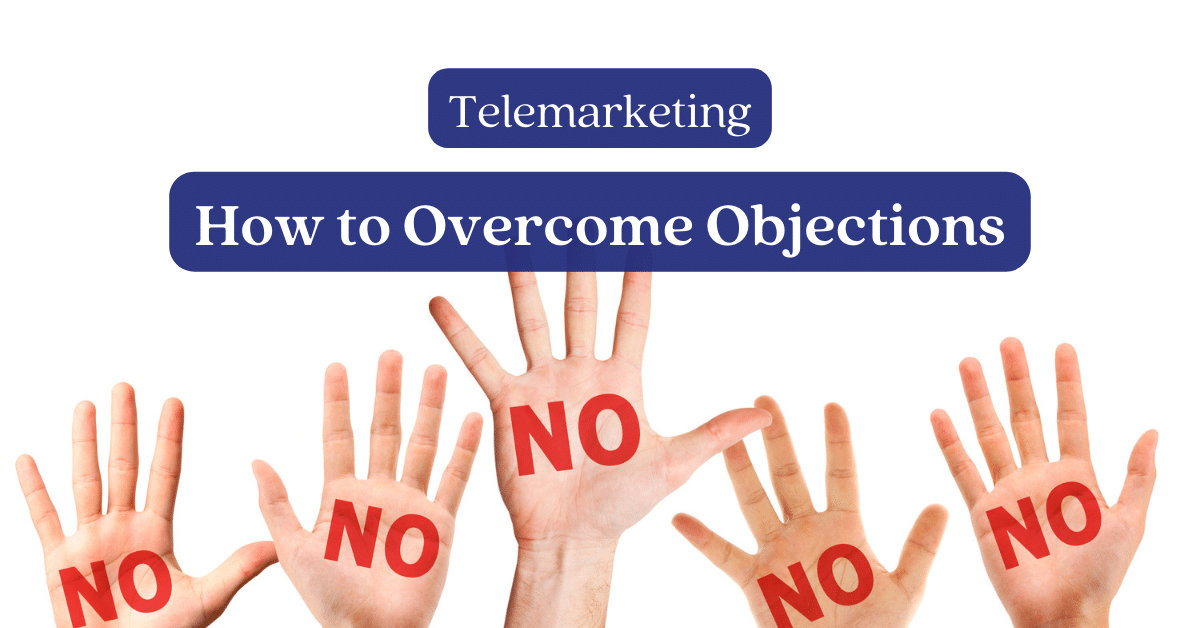Telemarketing: How to Overcome Objections
Every call counts when it comes to B2B telemarketing, and overcoming objections is a skill that can determine whether a lead can be generated or not. Telemarketing plays a pivotal role in connecting businesses with potential clients, and if you aren’t yet mastering the art of objection handling, it can become a major roadblock when generating leads.
In today’s blog, we’ll explore effective strategies for overcoming objections in B2B telemarketing, providing valuable insights for telemarketing companies and professionals alike.
What is Telemarketing?
Telemarketing is an outbound marketing tactic that involves identifying ideal customers, in order to market a product or service over the phone that provides solutions to a prospects’ needs. However, there is a lot more to telemarketing than that. It can involve, prospecting, lead nurturing, and appointment setting to name a few.
What is Objection Handling?
Objection handling is where a prospect challenges the individual based on the information they are used to pitch about a particular product or service. For example, if your sales representative is trying to pitch a bespoke CRM solution, the monthly subscription fee might not align with the prospects – this would trigger an objection.
Understanding the Landscape
Before delving into objection-handling techniques, it’s essential to recognize the unique challenges posed by B2B telemarketing. It involves complex decision-making processes and typically longer sales cycles. Telemarketers targeting businesses must navigate through multiple layers of hierarchy, emphasising the need for a nuanced approach.
Common Objections in B2B Telemarketing
Successful telemarketers anticipate objections and are well-prepared to address them. Common objections in B2B telemarketing include concerns about budget constraints, existing vendor relationships, scepticism about the product or service, and the need for more information. By identifying these objections in advance, telemarketers can tailor their responses and maintain control of the conversation.
Building Rapport and Credibility
One of the foundational elements in overcoming objections is establishing rapport and credibility from the outset. Before diving into the pitch, take the time to understand the prospect’s business, industry, and pain points. This not only demonstrates a genuine interest but also lays the groundwork for a more meaningful conversation.
Additionally, highlighting success stories or testimonials from similar businesses can bolster your credibility. Telemarketing companies often find that building trust early in the conversation can significantly reduce resistance to objections later on.
Active Listening and Empathy
Effective objection handling begins with active listening. When prospects express concerns or objections, resist the urge to interrupt. Instead, let them articulate their thoughts fully. This not only shows respect but also provides valuable insights into the root of their objections.
Empathy is a powerful tool in telemarketing. Acknowledge the prospect’s concerns and demonstrate an understanding of their perspective. By doing so, you create a connection and open the door for a more collaborative conversation.
Addressing Budget Concerns
Budget objections are a frequent hurdle in B2B telemarketing. When a prospect expresses concerns about cost, it’s essential to position your product or service as an investment rather than an expense. Emphasise the value and return on investment (ROI) that your offering brings to the table.
Consider offering flexible payment plans or discounts for long-term commitments. Providing a clear breakdown of the cost and demonstrating the potential cost savings can also help ease budget-related objections.
Navigating Competitor Loyalty
Many businesses are hesitant to change providers due to established relationships. To overcome this objection, telemarketers should focus on differentiating their product or service. Highlight unique features, superior customer support, or cost advantages that set your offering apart from the competition.
Moreover, positioning the transition as a seamless process with minimal disruption can alleviate concerns about switching vendors. Share success stories of businesses that have made a smooth transition, reinforcing the positive outcomes.
Handling Scepticism and Request for Information
Scepticism often stems from a lack of information or understanding. When faced with objections rooted in scepticism, be prepared to provide detailed information, case studies, and testimonials that validate the effectiveness of your product or service.
Additionally, offer to schedule a follow-up meeting or provide additional resources to address specific concerns. Demonstrating a commitment to transparency and willingness to provide the necessary information can build trust and overcome scepticism.
Conclusion
In conclusion, the ability to overcome objections is a hallmark of a skilled telemarketer. By incorporating these strategies into your B2B telemarketing approach, you can turn objections into stepping stones toward successful sales outcomes. As the landscape of telemarketing continues to evolve, adapting and refining objection-handling techniques will remain a key component of achieving sustainable success in outbound sales.
To find out more about our B2B telemarketing and lead generation services, contact us today at 0330 808 0866 or head to our website to get in touch.

Ryan Whyte is the Senior Campaign Manager where he leads a team of B2B telemarketers to deliver high-quality leads for clients. With a strong background in campaign management and a focus on driving results, Ryan is dedicated to optimising strategies that maximise client success in B2B lead generation.



















